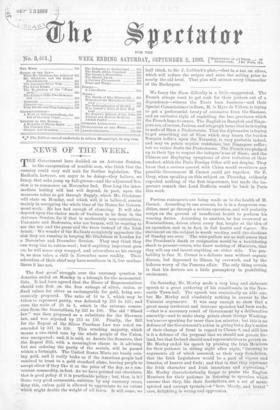The first great' struggle over the currency question in America
ended on Monday in a triumph for the monometal- lists. It had been agreed that the House of Representatives .13.ould vote first on the free coinage of silver, ratios, or ,fixed values for silver as exchangeable for gold, being suc- ,cessively proposed. The ratio of 16 to 1, which may be taken to represent parity, was defeated by 225 to 123; and -even the ratio of 20 to 1, which is the extreme comes- ion from the bimetallists, by 222 to 109. The old "Bland law" was then proposed as a substitute for the Sherman law, and was rejected by 213 to 136. Finally, the Bill for the Repeal of the Silver Purchase Law was voted un- -amended by 241 to 109. This crushing majority, which means a two-third vote by the whole people of the Union, was unexpected ; and, it is said, so daunts the Senators, that the Repeal Bill, with a meaningless olause in it advising but not ordering the parity of the metals, will be passed within a fortnight. The United States Mints are busily coin- ing gold, and it really looks as if the American people had resolved to trust to a gold standard alone, leaving people to accept silver if they like it at the price of the day, as a con- venient commodity, in fact. As we have pointed out elsewhere, that is good policy if it is practicable policy ; but, then, is it F 'Some very good economists, unbitten by any currency craze, deny this, unless gold is allowed to appreciate to an extent 'which might double the weight of all taxes. It will come, we half think, to Sir J. Lubbock's plan,—that is, a tax on silver, which will reduce the output and raise the selling price to nearly the old level. That plan will attract every Chancellor of the Exchequer.


































